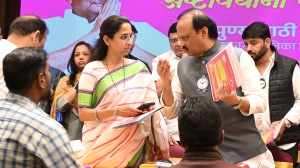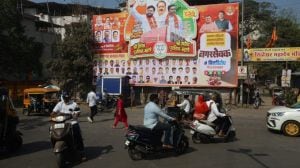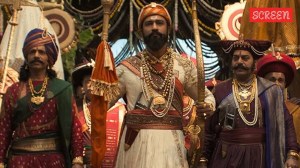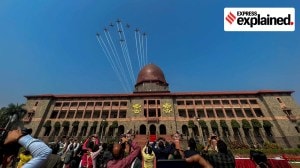For All the Gods
JASMINE-scented incense mingles with the aroma of saffron. Three generations of the Jung family have assembled for Iftar8212;the ritual bre...

 JASMINE-scented incense mingles with the aroma of saffron. Three generations of the Jung family have assembled for Iftar8212;the ritual breaking of the roza or fast8212;at Hameed Manzil, the family home in Old Delhi. The house is on the bustling main street of Daryaganj or 8216;river ghat8217;. Today, the Yamuna has changed course, and what flows instead is a constant stream of traffic.
JASMINE-scented incense mingles with the aroma of saffron. Three generations of the Jung family have assembled for Iftar8212;the ritual breaking of the roza or fast8212;at Hameed Manzil, the family home in Old Delhi. The house is on the bustling main street of Daryaganj or 8216;river ghat8217;. Today, the Yamuna has changed course, and what flows instead is a constant stream of traffic.
The fact that Ramzan and the recent Navratras have coincided after 32 years is not lost on the Jungs. As long-time residents of the old city8212;Hameed Manzil has been home to Nawab Zafar Jung and his family for more than a century8212;Hindus have always been neighbours. Iftar and Id-Milan are occasions when the family entertains their Hindu friends.
This Iftar is no different. Even as the Nawab breaks his fast with Zam-Zam, or holy water from Mecca, the doorbell rings. It8217;s Romesh Bhandari, the former governor of Uttar Pradesh. Greetings follow, and the tehzeeb8212;etiquette8212; is like a scene from a 8217;60s Bollywood Muslim social.
Sakina Begum, the 82-year-old matriarch, genially presides over the scene. Draped in black silk and pearls, she is the de facto hostess. 8216;8216;Only de facto,8217;8217; she stresses in a delightful blend of impeccable English and chaste Urdu. 8216;8216;My responsibilities are over, my children are all settled.8217;8217; However, she runs a guesthouse on the first floor of Hameed Manzil.
The polished veneer of old world charm belies the fact this is a family in step with the new millennium. Zafar Jung8217;s daughter-in-law, Ursala, is an MBA graduate. Two nieces are barristers educated in London, and another works with the World Bank in Washington.
The Jungs have always been progressive. Zafar Jung8217;s grandfather was a chief justice in the court of the Nizam of Hyderabad. Despite being trained as a maulvi, he studied law in England. Faithful service to the Nizam led to the title of Nawab and the epithet of Jung.
After the fast-breaking ritual of eating dates, the conversation turns to politics8212;a subject dear to the Jungs. Unabashed Congresswallahs, the Jungs8217; allegiance dates back to the freedom struggle, when Hameed Manzil hosted meetings attended by Maulana Azad, Sarojini Naidu and Mohammed Ali Jinnah.
Zafar Jung moulded Muslim public opinion during his stints on the Wakf Board and Haj committees. During the Rajiv Gandhi era, he was deeply involved with the Congress Party. In the very drawing room where the family has gathered to eat their Iftar dinner of biryani and korma, Gandhi8217;s close aides discussed strategy.
Today, Jung is clearly disenchanted. 8216;8216;I knew Rajiv intimately; after his death I was disinclined to remain politically active,8217;8217; he says.
Another Jung passion is charity. The basic tenet of zakat is that charity results in manifold blessings in jannat or heaven. Sakina Begum bemoans the fate of Muslim women, especially inside the Walled City.
She provides a few underprivileged families with rations. She doesn8217;t give money, she candidly admits, because most Muslims spend it at the butcher8217;s.
The elaborate spread put together by Jung8217;s wife, Tabassum, is quickly devoured and appreciated. This may well be the last Id that the Jungs celebrate in Old Delhi. A new house has already been built in Noida across the river8212;no longer Daryaganj but darya ke us paar across the river8212;and another grandchild is on the way.
For the Jungs, who trace their ancestry to Hazrat Ali, the fourth Caliph and Prophet Mohammed8217;s son-in-law, the upcoming Id is one to look forward to.
This year, the last Friday of Ramzan or 8216;Jum-Ad-Vida8217; coincides with Diwali. Tabassum exhorts us to come back to celebrate Id, warning us to expect a meatless meal cooked in honour of old friends who are strict vegetarians.
Perhaps our disbelief is evident, because she reassures us laughingly8212;and with never-failing hospitality8212;that korma and biryani will be cooked separately 8216;8216;especially for you8217;8217;.
- 01
- 02
- 03
- 04
- 05































